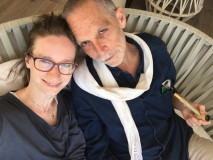About

Mark Abouzeid
Sophie Beer
Sophie and I left Austria on September 30th as programmed with our van filled with personal belongings and equipment just as border closures began. We left behind a mountain of ‘stuff’, some of which we sold but mostly we just gave it all away. And yet, despite our best efforts to be as ‘light’ as possible, we found ourselves driving away from Austria with a floor to ceiling packed van that had barely enough room for us to drive. The van (that we were going to live and work in) didn’t even have a place to sleep. Two months later...two months of navigating Covid restrictions...two months of working on the van...two months of living nomadic...we have experienced and: - Filmed olive harvests, saffron cultivation, hemp preparation, maltalliata pasta making - Interviewed chefs, writers, artists, and freelancers on how they are adapting and helping - Captured footage of empty towns, pristine beaches, solitary forests and natural skies thanks to the lack of people and air travel. It has not been easy. As I write this, I am wrapped in two blankets and a duveet to fight the cold and am nursing one bruised knee, two cracked ribs and a new scar on my forehead. Sophie has had less injuries but has also felt the effort, especially during the olive harvest. Each morning, however, as we are making coffee on a burner looking out over stunning landscape, one of us remarks on how amazing it all is: the beauty of place and of the stories we are collecting.
Plan Bee: “The State of Europe” expedition
239.7 km
From a casual support mechanism came “Walking out of Lockdown: What comes next?” podcast and video series, a collaboration by between creative partners Mark Abouzeid and Sophie Beer, Real Lives NGO and freelancers, artists, artisans and social protagonists throughout Southern Europe and around the globe. The Plan Bee: “The State of Europe” expedition will take the conversation on the road and into communities by travelling throughout Southern Europe, to produce vlogs, short films and podcast interviews of artisans, artists, change catalysts and underrepresented communities, capturing their experiences and inspiration for adaptation. Partnering with the Institute of Ecotechnics, the project will build upon the Oral History Archives expanding the focus to include adaptation strategies of creatives/artisans, impact on climate sustainability, impact on immigration/mobility, new forms of racism (country of origin pandemic response), lifestyle changes as a result, and, oral histories at a time when elders are dying en masse.